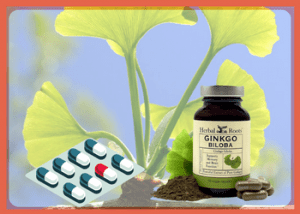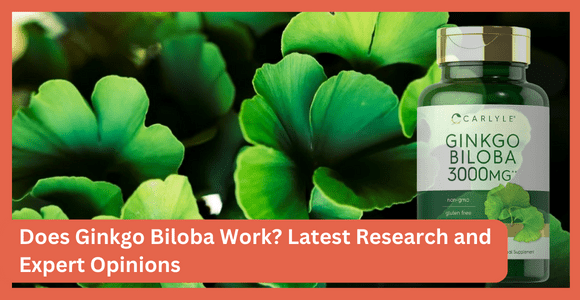Welcome to the revolutionary realm of Ginkgo Biloba, a natural supplement that has been shaking up the health industry for years.
You may have heard about its potential benefits: from enhancing brain function and diminishing anxiety levels to boosting your general wellness. But with so much conflicting data out there, it can be hard to pick through fact or fiction. Ready to discover the answer to this highly asked question on everyone’s lips?
Does Ginkgo Biloba really work? In today’s post, we’ll be examining all the current research and opinions of experts.
Uncovering its potential risks & benefits as well as exploring its scientific background with mechanisms – you can count on us for an in-depth exploration! So fasten your seatbelts & get ready to learn everything essential about the popular supplement.
Table of Contents
What Does Ginkgo Biloba Actually Do?
For centuries, Ginkgo biloba has been utilized in traditional medicine as a powerful natural supplement. Although its exact working process is not completely understood yet, numerous studies indicate that this herbal remedy could potentially bring an array of health and wellness benefits.
 GB has long been recognized for its ability to improve cognitive functioning.
GB has long been recognized for its ability to improve cognitive functioning.
Research suggests that this herb could potentially help enhance memory, focus, and mental processing speed in both healthy individuals and those with impaired cognition.
Scientists believe it works by optimizing blood circulation to the brain which can boost oxygen and nutrient delivery straight into our brain cells!
GB has the potential to reduce inflammation and act as an antioxidant, guarding your body against free radical damage. The effects could be profoundly beneficial for cardiovascular health, supporting cognitive performance with age, and easing symptoms of conditions like glaucoma or tinnitus.
Furthermore, ginkgo biloba could be utilized to ease signs of stress and depression, potentially by raising serotonin and dopamine levels in the brain.
It may also optimize blood flow while reducing inflammation, which can benefit your general heart health as well as lower the chances of a stroke.
Ginkgo biloba may have the potential to boost cognitive abilities, reduce stress and depression levels, as well as improve overall health; however, further research is necessary in order to uncover its full effects and find out optimal doses and recipes.
How Quickly Does Ginkgo Biloba Work? Dosage
The effectiveness of ginkgo biloba is not uniform across individuals, and the time it takes to see results depends on what you are hoping to gain from taking this supplement.
 While some may experience positive changes in cognitive function or reduced anxiety levels only a few hours after ingestion, others could take weeks or even months before they notice any improvement.
While some may experience positive changes in cognitive function or reduced anxiety levels only a few hours after ingestion, others could take weeks or even months before they notice any improvement.
Figuring out the optimal dosage of ginkgo biloba can be tricky since it depends on each individual’s needs and the product they are using.
Although most studies have reported successful results by taking doses between 120-240 milligrams per day in two or three divided dosages, generally the same for both men and women, you should always follow the instructions provided by your specific product manufacturer for the best results.
Potential Benefits. What Are the Negative Effects of Ginkgo Biloba?
Recent research suggests that ginkgo biloba may offer a range of potential benefits for health and well-being. Here are some of the key benefits:
- Cognitive function: It is good for memory, and attention, helps with vertigo, and mental processing speed in healthy individuals and those with cognitive impairment.
- Anxiety and depression: It may help reduce symptoms of anxiety and depression, possibly by increasing levels of serotonin and dopamine in the brain.
- Eye health: It may help reduce the risk of age-related macular degeneration and improve symptoms of glaucoma.
- Tinnitus: It may help reduce the severity and frequency of tinnitus, a ringing or buzzing sound in the ears.
- Cardiovascular health: It may help improve circulation and reduce inflammation, which may benefit heart health and lower the risk of stroke.
While these benefits show promising potential, more research is needed to fully understand the effects and determine the most effective doses and formulations.
It’s important to speak with a healthcare professional before adding any new supplement to your regimen.
Ginkgo Biloba Side Effects:
- Gastrointestinal issues: Some people may experience digestive issues such as nausea, diarrhea, or stomach upset when taking ginkgo biloba.
- Headache and dizziness: It may cause headaches, dizziness, or lightheadedness in some individuals.
- Allergic reactions: In rare cases, ginkgo biloba may cause an allergic reaction, which can range from mild skin irritation to severe anaphylaxis.
- Bleeding: It may increase the risk of bleeding, especially when taken with blood-thinning medications or before surgery.
- Seizures: High doses may increase the risk of seizures in individuals with a history of seizures or epilepsy.
It’s important to speak with a healthcare professional before taking, especially if you have a medical condition, take medications, or are pregnant or breastfeeding.
If you’re experiencing symptoms of a medical emergency, such as chest pain or difficulty breathing, it’s important to seek medical attention right away.
If you experience any adverse reactions or unusual symptoms while taking ginkgo biloba, discontinue use and seek medical attention immediately.
Frequently Asked Questions
What is Ginkgo Biloba Used for?
It is commonly used as a natural supplementation to improve cognitive function, memory, and concentration.
Is it OK to Take Ginkgo Biloba Everyday?
While it is generally safe, to ensure your safety and well-being prior to taking it regularly, you should consult with a healthcare professional.
When to Take Ginkgo Biloba in the Morning or Night?
To maximize its benefits, some people take GB in the morning to stay alert and focused during their day. Others may discover it better for them to use it as a nighttime supplement for restful sleep and assurance of relaxation.
Does Ginkgo Biloba Work Immediately?
In as little as four to six weeks, you can begin to witness improvements!
Does Ginkgo Biloba Cause Cancer?
Numerous scientific studies have confirmed that it does not cause cancer.
Is Ginkgo Biloba a Blood Thinner?
Absolutely, It carries the possibility of inducing bleeding due to its blood-thinning properties and may interact with certain medications that have similar effects.
Conclusion
It is essential to remember that the U.S. Food and Drug Administration does not have the legal authority to grant approval for dietary supplements before they are made available on the market.
According to Dilley, dietary supplements do not need to pass the same strict premarket tests as drugs meant for medical treatment.
To guarantee that these items contain only what they claim and no other unsafe elements, it is wise for consumers to seek out certified third-party products.
In summary, Ginkgo Biloba may offer potential as a natural supplement, however, if you’re uncertain about which ginkgo supplements to use, consult with your healthcare provider for advice.
